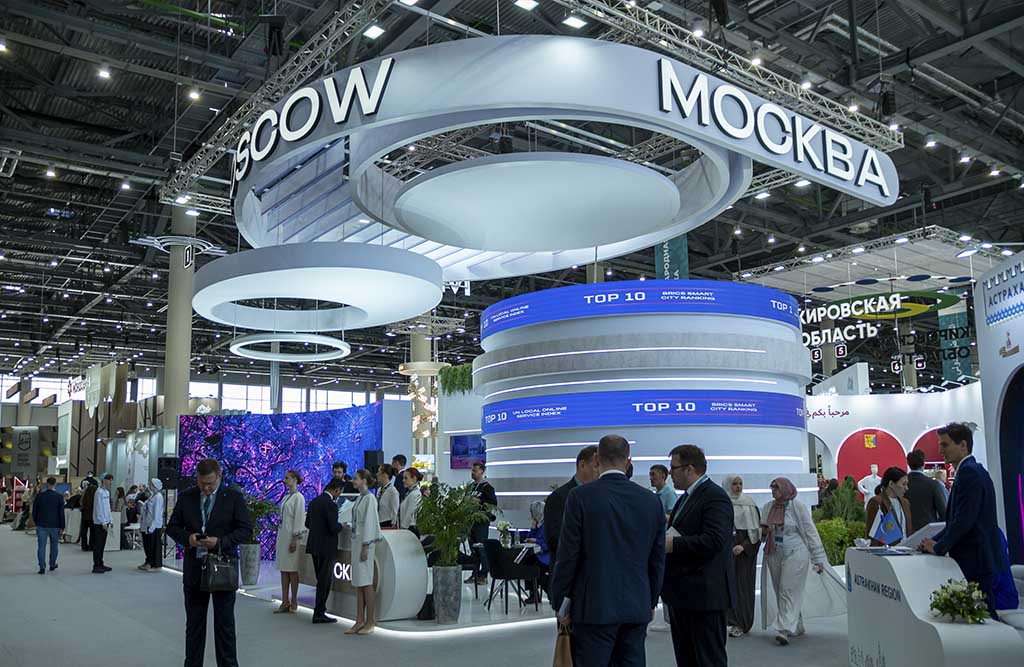Moscow Takes Active Part in 16th “Russia-Islamic World: KazanForum” International Economic Forum
The Department of External Economic and International Relations of Moscow (DEEIR) actively participated in the XVI International Economic Forum “Russia – Islamic World: KazanForum” held from May 13 to 18. The delegation was led by Sergey Cheremin, Minister of the Government of Moscow, Head of Department of External Economic and International Relations.
Minister Cheremin spoke at several key events, including the session “Russia – MENA Countries: From Trade to Cooperation Projects,” where he highlighted Moscow’s trade, economic, and investment cooperation with MENA nations. In 2024, Moscow’s trade volume with Middle Eastern and North African countries reached approximately $14.4 billion, showing not only growth but also increasing diversification. Beyond traditional commodity exports, there has been a rise in high-tech product shipments, including machinery, electrical equipment, optical instruments, heavy industry goods, and chemical products.
“Today, our active partners include Egypt and Algeria. We collaborate with Morocco and seek to establish ties with Tunisia. In the Middle East, our strongest relationships are with the UAE, Oman, Qatar, Bahrain, and Saudi Arabia,” noted Cheremin.
The Minister emphasized the favorable conditions for Moscow-based companies to localize production in Gulf countries. “Moscow remains attractive to Arab partners—we regularly host numerous delegations from various countries,” he added. Despite sanctions, foreign investment inflows into the capital remain steady, with cumulative investments exceeding $250 billion. Thousands of foreign companies continue to operate in Moscow, thanks to support measures available to both domestic and international businesses.
Plans include expanding business investments and active participation in congress and exhibition events across MENA countries.
From May 13 to 17, Kazan also hosted the IX Forum of Young Diplomats from the Organization of Islamic Cooperation (OIC) as part of the “Russia – Islamic World: KazanForum.” Dedicated to the theme “Diplomacy of Victory” in honor of the 80th anniversary of the end of the Great Patriotic War, the forum concluded on May 15 with a ceremony where Cheremin spoke about supporting young professionals. “Moscow actively fosters young diplomats through educational and professional initiatives, providing platforms for practical experience in international organizations, overseas internships, and Model UN programs,” he stated.
The Russia Halal Expo, held during KazanForum 2025, featured a prominent Government of Moscow pavilion visited by Russian Deputy Prime Minister Marat Khusnullin. Cheremin presented key areas of cooperation with Islamic world countries, including trade, joint technological projects, and knowledge-sharing in digitalization and sustainable urban development. The pavilion showcased smart city innovations, Moscow’s achievements in tourism, investment, and urban infrastructure, organized by DEEIR and the Moscow Center for International Cooperation.
During the session “Exporting Digital Solutions for Smart Cities: From Idea to Global Market,” Cheremin highlighted over 100 AI-driven initiatives in Moscow spanning telemedicine, education, economic management, transport, and utilities. “AI adoption across sectors is our competitive edge, keeping Moscow at the forefront of global rankings,” he emphasized. The city supports high-tech companies through funding, subsidies, and innovation hubs like technoparks and clusters, with digital solutions—particularly video surveillance and recognition systems—being highly sought after by international partners.
Prospects for cooperation with Malaysia were discussed at the roundtable “Russian-Malaysian Economic and Industrial Cooperation: Growth Through Technology and Innovation.” Malaysia is a key partner for Moscow, with a cooperation statement signed between the Government of Moscow and Kuala Lumpur City Hall in November 2024. “Bilateral trade reached $1.2 billion in 2024, reflecting strong business ties and mutual interest in urban development exchanges,” Cheremin noted. Priority areas include transport infrastructure, technological modernization, and digital governance, with Moscow also exploring Malaysia’s technopark expertise for potential joint innovation clusters.
